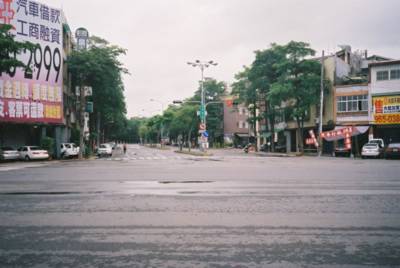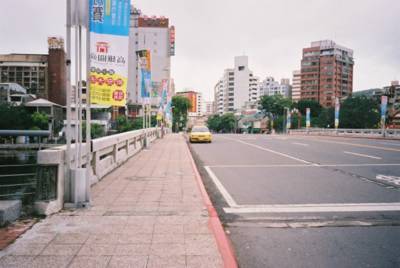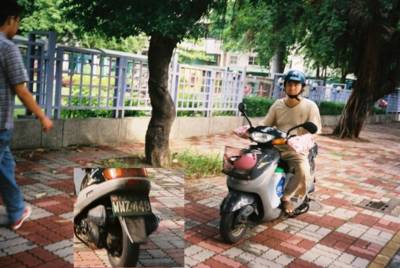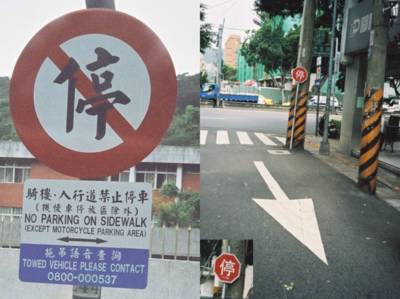
Wednesday, June 30
Body Donation
My cousin died a few days ago, "only" in his mid-fifties (so you can guess how old I am, at a minimum). He was cremated. My thoughts turn to body donation (some prefer the term anatomical gifts, but that sounds like this to me). 遺體捐獻 in Chinese. I've pretty much said everything I wanted to when I wrote about organ sales.
Since I wrote those two posts I've read Mary Roach's Stiff: The Curious Lives of Human Cadavers. I don't mind her joking, but sometimes her humor's a little strained. Someone's sure to say that's because she's uncomfortable with the subject, but I think sometimes she's just not funny. If she didn't joke, would that be proof that she was comfortable with her subject?
Anyway, there's nothing that she describes about what happens to dead bodies that could really bother me. Mary Roach herself seems ready for anything, except she doesn't want her corpse to be used to study crucifixion. Despite my anti-religiousness (I just typed crucifiction by mistake), I wouldn't particularly mind that, but I really think my heirs should get paid. One of the people in the book who works with cadavers says that she wouldn't donate her body, because the bodies aren't treated with dignity. Spare me! Whatever is dignified about human existence? If you don't believe me, take off your clothes and jump up and down in front of the mirror. And after you die, what do you think happens?
Since I wrote those two posts I've read Mary Roach's Stiff: The Curious Lives of Human Cadavers. I don't mind her joking, but sometimes her humor's a little strained. Someone's sure to say that's because she's uncomfortable with the subject, but I think sometimes she's just not funny. If she didn't joke, would that be proof that she was comfortable with her subject?
Anyway, there's nothing that she describes about what happens to dead bodies that could really bother me. Mary Roach herself seems ready for anything, except she doesn't want her corpse to be used to study crucifixion. Despite my anti-religiousness (I just typed crucifiction by mistake), I wouldn't particularly mind that, but I really think my heirs should get paid. One of the people in the book who works with cadavers says that she wouldn't donate her body, because the bodies aren't treated with dignity. Spare me! Whatever is dignified about human existence? If you don't believe me, take off your clothes and jump up and down in front of the mirror. And after you die, what do you think happens?
Tuesday, June 29
Who to Believe?
Nick Gillespie earlier declared,
On a very basic level, it’s virtually impossible to know whether the occupation is going well or horribly wrong. This is above and beyond the question of whether we should be there in the first place.Similarly,
...domestic reality is up for grabs: The candidates want you to buy very different depictions of America. Is the economy still in the shitter? (And was it ever there, really, especially given levels of joblessness that were always below what used to be considered inevitable "frictional unemployment"?) Did President Bush’s tax cuts (and/or unrestrained government spending) jump start the growth we may or may not be experiencing? Exactly how many jobs have been lost due to offshore outsourcing and how many to automation and other irrefutable signs of what used to be called progress?Now via Instapundit, Eric M. Johnson, who participated in Operation Iraqi Freedom as a Marine Corps reservist, suggests the American media are giving a misleading picture. There's a surprise.
Hallo! Hallo!
According to the 國語辭典, 【喝囉】he4 luo2 is an old expression meaning noisy 吵吵鬧鬧. Is that what the Chinese are trying to express when they call out "Hallo" to foreign devils they don't know?
Monday, June 28
I guess we now know why the FCC is cracking down on this kind of stuff: it's a conspiracy so the Bush admin can insult its opponents but the media can't report it. They weren't counting on the Washington Post! The Taiwanese gave the impression that Cheney was fined for that.
Meanwhile we're all in a tizzy here about the liu niao xia 遛鳥俠. A xia is a martial arts hero. "Liu niao" is the Chinese custom of taking your birds for a walk (see below). Lin Yutang identifies niao as a variant of diao 屌, penis. Anyway, liu niao xia is a humorous phrase coined to refer to a college student who streaked because he lost a bet when the Lakers lost. So you see, it's really the Americans' fault.
"Bird walking": The bird walker holds on to the top of their cages and swings them while they grip their perches. Are they hanging on for dear life? Or do they like it? I don't know. It's like Zhuangzi 莊子 and Huizi 惠子 at the Hao 濠 river bridge. I recall an article about the treatment of animals, and how it was difficult to figure out what was best for them. The writer conceded that one could observe what the animals seemed to like, but then went on to argue that what animals liked wasn't necessarily what was good for them.
Meanwhile we're all in a tizzy here about the liu niao xia 遛鳥俠. A xia is a martial arts hero. "Liu niao" is the Chinese custom of taking your birds for a walk (see below). Lin Yutang identifies niao as a variant of diao 屌, penis. Anyway, liu niao xia is a humorous phrase coined to refer to a college student who streaked because he lost a bet when the Lakers lost. So you see, it's really the Americans' fault.
"Bird walking": The bird walker holds on to the top of their cages and swings them while they grip their perches. Are they hanging on for dear life? Or do they like it? I don't know. It's like Zhuangzi 莊子 and Huizi 惠子 at the Hao 濠 river bridge. I recall an article about the treatment of animals, and how it was difficult to figure out what was best for them. The writer conceded that one could observe what the animals seemed to like, but then went on to argue that what animals liked wasn't necessarily what was good for them.
I'm not saying it's her fault, but accessed from Taiwan, Wonkette has an ad link to what looks like a scam on the US Diversity Visa Lottery. (Click pic below for larger screen capture.) Actually, she's probably lucky she doesn't get ads for--well, for some of things she talks about.
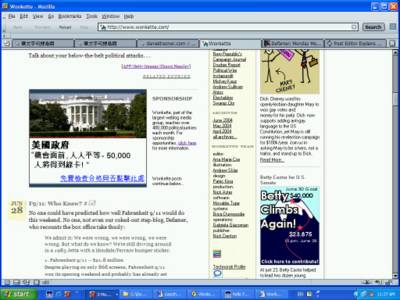

Amir Taheri says,
Suicide-killing is never an individual decision. It needs a context of real or imagined war. It needs recruitment, training, information, espionage, surveillance, logistics, material, propaganda, and, of course, financial resources. It also needs political leaders who order suicide-killings in the context of specific strategies...I'm afraid the answer to "the real issue" he raises is "No".
The real issue is whether or not those targeted by suicide-killings are prepared to retaliate with a higher degree of violence that would reverse the cost-benefit ratio in their favour and thus persuade their foes to abandon the human body as a weapon.
Adam Michnik:
I look at the war in Iraq from three points of view. Saddam Hussein's Iraq was a totalitarian state. It was a country where people were murdered and tortured. So I'm looking at this through the eyes of the political prisoner in Baghdad, and from this point of view I'm very grateful to those who opened the gates of the prison and who stopped the killing and the torture. Second, Iraq was a country that supported terrorist attacks in the Middle East and all over the world. I consider that 9/11 was the day when war was started against my own work and against myself. Even though we are not sure of the links, Iraq was one of the countries that did not lower its flags in mourning on 9/11. There are those who think this war could have been avoided by democratic and peaceful means. But I think that no negotiations with Saddam Hussein made sense, just as I believe that negotiations with Hitler did not make sense. And there is a third reason. Poland is an ally of the United States of America. It was our duty to show that we are a reliable, loyal, and predictable ally. America needed our help, and we had to give it. This was not only my position. It was also the position of Havel, Konrad, and others.To summarize:
- Saddam Hussein's Iraq was a totalitarian state.
- Iraq was a country that supported terrorist attacks.
- Poland is an ally of the United States of America.
Daniel W. Drezner:
Earlier this month the Bureau of Labor Statistics reported that offshore outsourcing was responsible for 2.5 percent of jobs lost through mass layoffs in the first quarter of this year--not exactly a large number. Studies at the state and local level buttress this finding. In Colorado, one study found that to date offshoring's impact on IT jobs was exaggerated by media reports. In Detroit, another study concluded that outsourcing's effect on manufacturing jobs had been "overemphasized." The net creation of over a million new private-sector jobs since January has also demonstrated that the effect of offshoring on the national economy is insignificant...
But don't hold your breath waiting for public attitudes to follow suit. For one thing, there is a significant lag between the reporting of good economic news and the internalization of that news by Americans. Earlier this month, an Associated Press poll found that 57 percent of respondents believed the nation has lost jobs in the last six months, even though 1.2 million jobs had been created during that span.
More importantly, however, even before the last recession, Americans did not have warm and fuzzy feelings about trade. Kenneth Scheve and Matthew Slaughter catalogued hostility to free trade policies in Globalization and the Perceptions of American Workers. Throughout the late 1990s, majorities of Americans repeatedly affirmed their belief in two things: that the costs from more imports always outweighed the benefits of more imports; and that the costs from more imports exceeded the benefits from more exports. Go back to the early 1950s--when the U.S. was running a massive trade surplus--and a plurality of Americans still supported import restrictions over import expansion. Americans are mercantilists in the sense that they support trade liberalization only when they believe it will improve export opportunities with no threat of increasing imports.
Given the widespread support among economists for trade liberalization, are Americans just stupid? Not really--they're merely responding to how politicians talk about the topic. Both advocates and opponents of freer trade talk about the issue using the language of how policy change will affect the trade deficit--even though there's no correlation between the balance of trade and income. Even politicians who advocate trade liberalization do so by focusing on increasing American exports and downplaying imports. This ignores the fact that trade is not a zero-sum game; the gains of other economies can also benefit our own. For instance, imports help to lower consumer prices and increase consumer variety. Former Treasury Secretary Robert Rubin observed in his memoirs that when he mentioned this fact in Congressional testimony, a representative told him that he was the first government official to praise the virtues of imports in public...
But there is one silver lining to this phenomenon, which is that Americans are massive hypocrites. People may believe in mercantilism, but they don't act on those beliefs in large numbers. Consumer lender E-loan conducted an interesting experiment this spring--it gave customers a choice between having their loan paperwork processed in ten days overseas or twelve days in the United States. In the first three months of the experiment, more than 85 percent of customers chose the overseas option. This corresponds with the May AP poll showing that while a majority of Americans think that offshoring is bad for the economy, a plurality of Americans do not bother checking the label to see if a product is made in this country. As citizens, Americans think of economic policy in mercantilist terms. But as consumers, they are quite content with free trade.
Huge Kite Lifts Man, Who Gets Hurt in Fall
BEIJING - A man in south China broke both his legs and an arm when he fell to the ground after a fast-rising kite pulled him 5 meters (16 feet) into the air, the official Xinhua News Agency said Saturday.I seem to recall somebody (Joseph Needham) arguing the Chinese invented manned flight on the basis that a Six Dynasties emperor strapped POW's to big kites, flew them, then had the rope cut, "setting them free" (mocking the Buddhist act of setting animals free 放生 as an act of piety.)
Sunday, June 27
Too serious to be left to the fans:
The authors of "The Economics of Sport"[Robert Sandy, Peter J. Sloane and Mark S. Rosentraub] ask their readers to consider the following signs of obsession, and to guess which sport they are describing: athletes' pay running at ten times that of a doctor or a lawyer; promotional symbols and motifs festooning cups, lamps and fans' homes; and huge profits arising from the ownership of the rights to players.
An account of soccer today? Actually, no: it is instead a description of the gladiatorial games of Roman times...
Perhaps the most pernicious myth they lay to rest is the idea that governments can use sport as a tool of economic development. Billions of dollars of public money have been used to construct stadiums around the world, yet the benefits in the form of economic growth have been elusive. In America, politicians have been especially keen to use taxpayers' money to support local teams, but other countries too have pursued sporting events as a tool of economic salvation and urban renewal, witness the eagerness with which countries recently bid to host the 2012 Olympics. This is mostly a fool's errand.
I'm ashamed to say I'd nearly forgotten Yao Fuxin 姚福信 and Xiao Yunliang 肖云良, even as Wives of Jailed Activists In China Urge U.S. Aid: Appeal Made as Cabinet Members Visit By Philip P. Pan:
Yao, 53, and Xiao, 58, are serving seven- and four-year prison sentences, respectively, for leading a series of mass protests in northeastern China's rust belt in the spring of 2002. The demonstrations, among the largest to take place in China in recent years, attracted tens of thousands of laid-off workers demanding unpaid wages and punishment for corrupt officials.Emphasis mine.
The health of both men has deteriorated in prison, and they suffer serious heart problems, their wives said. Yao has lost feeling in half of his body and has difficulty moving his right leg. Xiao is having trouble breathing and was put on a respirator twice in December, they said.
Xiao is also blind in one eye and can see no more than a foot away with his other eye because of an injury he suffered during his arrest in March 2002. Prison doctors have recommended surgery, but Chinese authorities have not granted permission for him to be transferred to a local hospital, Su said.
She and Yao's wife, Guo Sujing, 54, urged [Commerce Secretary Donald L. Evans and Labor Secretary Elaine L. Chao 赵小兰] to press the Chinese leadership to grant their husbands medical parole. There was no immediate response Tuesday night to a request for comment from Evans, but a spokeswoman for the labor secretary said Wednesday morning, "Secretary Chao will be bringing up this issue in her meetings with Chinese officials."
The State Department recently placed Yao and Xiao on a list of high-priority political prisoner cases to discuss with Chinese officials.
The Chinese government views independent labor activism as a threat to its authority, and it prohibits workers from forming their own labor unions, requiring them instead to join weak, party-run unions. In an unfair-trade complaint rejected by the Bush administration this year, the AFL-CIO argued that China's ban on independent unions was helping the government keep the prices of Chinese products unfairly low, which resulted in the loss of U.S. manufacturing jobs. But some economists, including Nicholas Lardy of the Institute for International Economics, say China's labor pool is so large that ending the ban on unions and other violations of workers' rights would not raise Chinese wages and prices as sharply as the AFL-CIO argues.
Despite an Act of Leniency, China Has Its Eye on the Web By HOWARD W. FRENCH
Internet cafe users in China have long been subject to an extraordinary range of controls. They include cameras placed discreetly throughout the establishments to monitor and identify users and Web masters, and Internet cafe managers who keep an eye on user activity, whether electronically or by patrolling the premises.
The average Internet user, meanwhile, neither sees nor, in many cases, suspects the activities of a force widely estimated to number as many as 30,000 Internet police officers. Experts on China's Internet say the officers are constantly engaged in a cat-and-mouse game with equally determined Web surfers, blocking access to sites that the government considers politically offensive, monitoring users who visit other politically sensitive sites and killing off discussion threads on Internet bulletin boards. The Chinese government has also established a Web site where people are able to report fellow Web users for suspicious or provocative behavior.
Web surfers who try to visit sites being blocked by the government receive messages announcing a page is no longer accessible, or their computer screen may simply go blank, or they may be redirected to unrelated sites. Similarly, people who participate in Web-based discussions on certain subjects may be warned that in order to log on to a discussion group, real names must be used, along with genuine e-mail addresses and even telephone numbers.
As its first line of defense against what in another era China's Communist leadership might have called ideological pollution, Beijing controls the Internet by insisting that all Web traffic pass through government-controlled servers. Now, coming on top of these measures, which are all deployed at the national level, China's provincial governments are getting into the act, introducing regulations of their own that critics say severely impinge on privacy and freedom of speech.
In recent weeks, Shanghai, China's largest and most Internet-connected city, has quietly introduced a series of controls, arguably the country's most far-reaching yet, and critics fear, a model eventually to be used nationwide. ...the Shanghai regulations require customers to use swipe cards that would allow administrators or others to record their national identity numbers and track their Internet use...
International analysts who follow China's Internet scene say that the government has been particularly taken aback by the explosion in a new form of online communication for China - the Weblog, or blog. It started last year with a celebrated case of a young woman who made a running online commentary about her own sex life, and now hundreds of thousands of people take enthusiastically to this form...
According to the analysts, the country's censors, always eager to contain waves of public opinion before they get out of hand, particularly in matters of politics, have become alarmed that despite their intense efforts, Internet technology is quickly making free expression far harder to control...
"No matter how hard they try, though, it is a fact that the volume of online information is increasing vastly, and there's nothing the government can do about that. You can monitor hundreds of bulletin boards, but controlling hundreds of thousands of bloggers is very different."
China Pays a Price for Cheaper Oil By KEITH BRADSHER: Many refineries in China are buying cheaper high-sulfur crude,
and turning it into fuels that may contain many times more sulfur than the gasoline and diesel sold in the United States or Europe.
Environmentalists call sulfur the world's biggest single contributor to air pollution. It forms noxious gases like sulfur oxides, and it causes diesel engines to spew more soot. And high-sulfur fuel quickly ruins the catalytic converters installed on new gasoline-powered cars, defeating one of the main efforts in countries like China to cut down on the harm that vehicles do to air quality.
Saturday, June 26
This year's annual Dragon Boat races were sponsored by the Athletic Field of the City of Kaohsiung and the Temple of Guandi, a diety who was originally a historical figure--Guan Yu (AD 160-219)--prayed to for protection and prosperity, and to solve all kinds of problems: personal, domestic, national and universal. He prayed to by Hong Kong policemen to help deliver justice and for courage, and by the criminal gangs known as the Triad because they see him as an epitome of loyalty. Cantonese businessmen also pray to him for prosperity; in Chinatowns all over, you'll often see an altar to him in the shop.
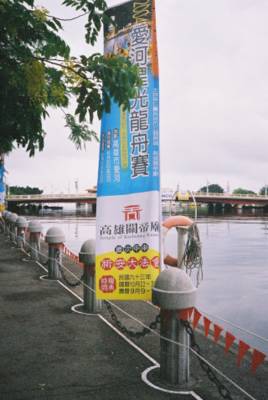

The middle of the block is blocked by this crap that has been sitting there for years.

On the other side of that, there's this illegal building that's been there for years (the Hotel Sunshine, below, is on the other side).

Hotel Sunshine 陽光大飯店 partially blocks the arcade with its limousine. The far end is also blocked by a curtain and a large sign advertising a "club" (a hostess bar), although this site says it's just a piano bar.


On the other side of that, there's this illegal building that's been there for years (the Hotel Sunshine, below, is on the other side).

Hotel Sunshine 陽光大飯店 partially blocks the arcade with its limousine. The far end is also blocked by a curtain and a large sign advertising a "club" (a hostess bar), although this site says it's just a piano bar.

Motorcycle riders in Kaohsiung commonly drive on the sidewalk, sometimes to park, but often because they're too lazy to drive around the block. That means pedestrians must dodge them. These pictures were taken next to a primary school (苓洲國民小學, which even has a site in English). Here's Dad bringing his daughter to school with little brother riding in front. No helmet on either one.
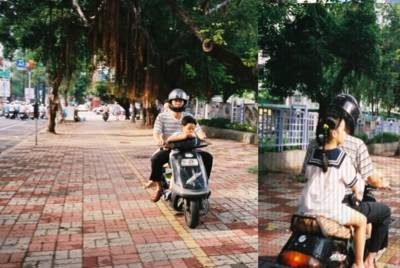

Out of the Dark In Rural China: Electricity Transforming Village Life By Peter S. Goodman:
...if electricity has elevated material conditions, it has also heightened awareness of how poor this area is.So electricity leads to social upheaval?
Tashi Phongtsok, 46, a father of three, has two teenage children studying at a school in Zhongdian. He pays $750 per year for their tuition and boarding. It is more than his annual household income, forcing him to borrow from relatives. Though he has faith this is a good investment in his children's future, the nightly television broadcasts rankle, the images of Shanghainese riding around in new cars and buying designer clothes in steel and glass malls.
"It makes us frustrated," he said. "We are so far away from the development. In the city, they have everything. Here, we have nothing."
A full day's walk upriver, on a trail blasted into the cliffs towering over the river, the village of Bala occupies a muddy plateau beneath snow-capped peaks. Electricity arrived here last June. It runs only between 7:30 and 10:30 at night.
The Niyi township government donated the diesel generator -- the village is too far above the river for hydro -- but keeping it running is the responsibility of the locals. Twice a year, each of the nine families of the village must trudge down the gorge to the road to buy diesel fuel, then carry it home on the back of a donkey. Each household contributes about $4 per month to cover the costs.
Here, too, pine branches have been replaced by light bulbs. But sawing logs for new houses remains manual labor. Water comes from a rain collection tank.
"If we had more electricity, we could use an electric stove, tape players, a rice cooker, a washing machine," said Tsering Lhazom, as she ran a wooden rod through a churn to mix yak butter tea, the creamy, salty concoction that is a staple in these mountains.
Bala is so far from the road that villagers are limited in their access to the cash markets of Gonjo. Household income here hovers around $300 per year.
Still, the lone teacher at Bala's school, Lobang Tashi, sees the arrival of television as a potential force of economic ascendance. Educated in town, he is one of the only people in Bala who can speak proper Mandarin Chinese, the national language that students must master in order to pursue advanced studies. Most here speak only a unique Tibetan dialect. Now, his students -- who range in age from 6 to 11 -- are parked nightly in front of the television, absorbing entertainment in Mandarin.
"It has improved their listening comprehension and it helps them understand life outside the village," the teacher said. "They see airplanes, cars, things they would never see here. It broadens their view."
Kaohsiung certainly has its share of lousy restaurants. Last week we ate at a Thai restaurant called Tai feng fu 泰豐富. Well, supposedly Thai food--it actually didn't taste like much of anything at all, and the servings were pretty small. The Ambassador Hotel 國賓大飯店 has 蜀珍宴 a supposedly Sichuan restaurant, but even the food that's marked on the menu as very spicy isn't. When we spoke to one of the waitresses about that, she said "If it were spicy, no one would eat it." Today we just went to 高雄中信大飯店 CHINA TRUST KAOHSIUNG. (You might well ask why a trust company has a hotel.) We went to 港都茶樓 for Cantonese style dim sum 港式飲茶點心, and most of the dishes were cold, the fried noodles were extremely salty, and some of the meat in the dishes tasted a little old.
Tuesday, June 22
JIM HOLT:
The happier your mood, the more liable you are to make bigoted judgments -- like deciding that someone is guilty of a crime simply because he's a member of a minority group...
As the British psychologist Richard P. Bentall has observed, "There is consistent evidence that happy people overestimate their control over environmental events (often to the point of perceiving completely random events as subject to their will), give unrealistically positive evaluations of their own achievements, believe that others share their unrealistic opinions about themselves and show a general lack of evenhandedness when comparing themselves to others." Indeed, Bentall has proposed that happiness be classified as a psychiatric disorder.
That may be going a bit far. But the evidence he cites, along with the newfound link between "well-feeling" and prejudice, might at least shake our belief in happiness as the summum bonum. Over the last few decades, it is precisely the groups that have made the most social progress in the United States -- women and educated African-Americans -- that have reported declines in their level of happiness. On reflection, this is not surprising. As education and freedom increase, desires -- and unmet desires -- inevitably multiply; our well-feeling may decrease, even as life becomes fuller and more meaningful. In Eastern nations like China, where happiness as a goal is less highly rated, people report lower levels of life satisfaction, but they also have lower suicide rates.
Monday, June 21
According to Nationmaster, in 2002 Afghanistan was the world's largest producer of illegal opium, with potential opium production of 1,278 metric tons. Burma was the world's second largest producer of illicit opium, with potential production of 630 metric tons. The world's third-largest illicit opium producer was Laos with an estimated potential production of 180 metric tons. Colombia's potential production of heroin was 11.3 metric tons, and Mexico's was 7 metric tons.
Minor or limited producers of illegal opium included (in no particular order): Thailand, Lebanon, Albania, Ukraine, Georgia, Russia, Moldova, Belarus, Kyrgyzstan, Azerbaijan, Tajikistan, Guatemala, Vietnam, Cambodia, Pakistan, Kazakhstan, Venezuela, Uzbekistan, Turkmenistan, and Peru.
India was the world's largest producer of licit opium, Australia apparently the second; Turkey also engaged in legal opium poppy cultivation.
Minor or limited producers of illegal opium included (in no particular order): Thailand, Lebanon, Albania, Ukraine, Georgia, Russia, Moldova, Belarus, Kyrgyzstan, Azerbaijan, Tajikistan, Guatemala, Vietnam, Cambodia, Pakistan, Kazakhstan, Venezuela, Uzbekistan, Turkmenistan, and Peru.
India was the world's largest producer of licit opium, Australia apparently the second; Turkey also engaged in legal opium poppy cultivation.
It's zongzi 粽子 time. I don't find this link or this one totally correct. Nor even this one. Taiwanese zongzi favor dried shrimp or dried reconstituted squid. I find the first a little disgusting and the second superfluous. And the five-spice powder in the second link isn't really proper, either. No, the ideal zongzi has glutinous rice 糯米 with a little soy sauce; a piece of fatty pork, stewed until soft; some boiled peanuts or maybe cooked pigeon peas; a dried reconstituted shiitake mushroom; and if you want to get fancy, part of a salted duck egg yolk; and a fresh or dried reconstituted chestnut.
So what do I get? A zongzi with not very glutinous 糯 rice, black rice, mushrooms, and a little square of tofu in the middle, pretending to be pork. A vegetarian told me that fake vegetarian food was for helping non-vegetarians get used to vegetarian food, so meat eaters shouldn't criticize it for not being vegetarian enough. Still, this is ridiculous.
So what do I get? A zongzi with not very glutinous 糯 rice, black rice, mushrooms, and a little square of tofu in the middle, pretending to be pork. A vegetarian told me that fake vegetarian food was for helping non-vegetarians get used to vegetarian food, so meat eaters shouldn't criticize it for not being vegetarian enough. Still, this is ridiculous.
According to Mirror, mirror on the wall
...it is undeniable that the average person in the euro area is still about 30% poorer (in terms of GDP per person measured at purchasing-power parity) than the average American, and this gap has barely changed over the past 30 years. Thus even if income per person is growing at almost the same pace as in America, Europeans are still stuck with much lower living standards than Americans.Then it cites Olivier Blanchard, an economist at the Massachussetts Institute of Technology, on why Europeans work less than Americans. He
concludes that most, but not all, of the fall in hours worked over the past 30 years is due to a preference for more leisure as incomes have increased. Europeans simply enjoy leisure more. Americans seem more obsessed with keeping up with the Jones's in terms of their consumption of material goods. As a result, they may work too hard and consume too little leisure. Their GDP figures look good, but perhaps at a cost to their overall economic welfare.Yeah, despite being an American myself, I find the Americans overly materialistic, even at the same time that they're more religious than the Europeans. I suspect that with increasing wealth, the Chinese will turn out to be pretty materalistic, too. I wonder if they'll be spiritual, too.
In Consumers corner multinationals, Antoaneta Bezlova reports,
...when consumer rights are cited in relation to a top-end foreign product, many Chinese feel their national dignity is at stake and join forces to fight perceived discrimination...And where's the outrage there? Certainly the government censors encourage the bashing of foreigners, but I believe the average person (and not just in China) is more upset at a perceived harm or insult from what they see as an outsider, even if it's not as serious as one they receive from their own group. Fools.
While government bodies have shown little hesitation in pursuing complaints targeting foreign products, by contrast, however, nationwide quality scams have been tolerated for months even when people's lives were at stake. For instance, domestic producers of fake milk powder who were responsible for the deaths of 12 babies in April were able to get away for a year before public anger jolted the government into action.
Interviewed in Asia Times, Juan Cole says,
I discern an unwritten rule among American journalists, that the American public is not interested in places which have their own government. The real significance of the so-called handover of sovereignty is that the Bush administration and its political advisers are hoping that the American press will take this moment as a cue to turn to reporting about Laci Peterson and other nonsense stories, local murder mysteries.
Bruce Joffe wrote this letter to the Economist:
SIR - While many who would deify Ronald Reagan praise his being "tough" against communism and terrorism ("The first post-Enlightenment president?", Economist.com, June 7th), I am thinking about the 241 Marines who were killed when their barracks were bombed in 1983. President Reagan's tough response was to abandon Lebanon. It is only now that we know this was a seminal event in Osama bin Laden's career; it was the moment he saw the United States as a paper tiger. The larger-than-life image of a president who secretly sold missiles to terrorists in exchange for hostages and who used the money to conduct a war prohibited by our United States Congress deserves adulation for just one thing: the stagecraft of a Hollywood icon.
In a subscriber-only article about Water shortages in China
Last year China consumed four times as much water for each 10,000 yuan ($1,200) of GDP compared with the world average, the Ministry of Water Resources said this month.What about pricing it? John Peet wrote earlier, the wasteful misuse of water
But keeping the capital well supplied is a top political priority. Beijing relies heavily on water from Hebei, which has little choice but to provide generous quantities in spite of its own acute needs.
stems largely from a wilful refusal to treat water as an economic good, subject to the laws of supply and demand. Water, the stuff of life, ought to be the most precious of all gifts. Yet throughout history, and especially over the past century, it has been ill-governed and, above all, colossally underpriced. Indeed it is often given away completely free. Not only does this ignore the huge costs of collecting, cleaning, storing and distributing it, to say nothing of treating waste-water and sewage. It also leads to overuse of water for the wrong things, especially for highly water-intensive crops. This survey will argue that the best way to deal with water is to price it more sensibly—to reflect, so far as possible, the costs of providing it (including environmental costs), as well as its marginal utility.After all, China Boosts Power Prices to Slow Usage.
Victor Davis Hanson writes that Bin Laden's Islamic fascists can find ideological support in the West,
despite their agenda of gender apartheid, homophobia, religious persecution, racial hatred, fundamentalism, polygamy, and primordial barbarism....[T]hey sensed that there has always been a current of self-loathing among the comfortable Western elite, a perennial search for victims of racism, economic oppression, colonialism, and Christianity...via aldaily
Our diplomats court the Arab League, which snores when Russians and Sudanese kill hundreds of thousands of Muslims but shrieks when we remove those who kill even more of their own. And a depopulating, entitlement-expanding Europe believes an American president, not bin Laden, is the greatest threat to world peace. Russia, the slayer of tens of thousands of Muslim Chechans and a big-time profiteer from Baathist loot, lectures the United States on its insensitivity to the new democracy in Baghdad.
Sunday, June 20
In Kaohsiung some of the intersections have cameras to photograph trafic violations. It's possible to buy sevices to help detect the cameras, and also to bribe those who develop the photos, not to mention the police.
I've been told, in Bolivia, all you have to do to get out of trouble with the law is to open your wallet and pull out a twenty dollar bill because there is no police there, the army runs everything.
I've been told, in Bolivia, all you have to do to get out of trouble with the law is to open your wallet and pull out a twenty dollar bill because there is no police there, the army runs everything.
In New Tests for Fetal Defects, Agonizing Choices for Parents By AMY HARMON:
Fetal genetic tests are now routinely used to diagnose diseases as well known as cystic fibrosis and as obscure as fragile X, a form of mental retardation. High-resolution sonograms can detect life-threatening defects like brain cysts as well as treatable conditions like a small hole in the heart or a cleft palate sooner and more reliably than previous generations of the technology. And the risk of Down syndrome, one of the most common birth defects, can be assessed in the first trimester rather than waiting for a second-trimester blood test or amniocentesis...Yeah, well, so what. People want beautiful kids, and I'm betting there are going to be more and more efforts to get them.
Against the backdrop of a bitter national divide on abortion, couples are devising their own very private scales for weighing whether to continue their pregnancies. Often, political or religious beliefs end up being put aside, trumped by personal feelings. And even many of those who have no doubts about their decision to terminate say the grief is lasting...
Whatever they choose, couples find themselves exposed to judgments from all sides. Several of those interviewed asked that personal details be withheld because they had let friends and family believe that their abortion was a miscarriage. Others say they have been surprised that even conservative parents, who never faced such decisions themselves, have counseled them to abort rather than face too hard a life.
Activists for the rights of the disabled say that a kind of grass-roots eugenics is evolving that will ultimately lead to greater intolerance of disabilities and less money for cures or treatments.
Waleed Ziad blames the West for creating conditions conducive to Islamic fundamentalism:
The turning point was the 1979 Soviet invasion of Afghanistan. The West and its allies decided the best resistance to Moscow would come through presenting the war as a religious struggle. While Pakistani religious leaders had little political power, they did have considerable influence over the madrasas in Pakistan's northwestern frontier region and in Afghanistan. Even the most benign found this to be an opportunity to finally win recognition (and a fortune), and they set up their own militant subsidiaries. Madrasas were converted overnight into training grounds for mujahedeen. In exchange for political power and global recognition, these impoverished students readily became cannon fodder in Afghanistan...
To battle this phenomenon, then, we need to open a new front on the war on terrorism. Permanently dislodging these extremists calls for educational, economic and cultural development. A first step should be working with Afghanistan and Pakistan to move the focus of the madrasas away from holy war. Equally important is providing more Western money for new schools to provide functional education, coupled with real economic opportunities for graduates.
Saturday, June 19
The Modern Language Association Language Map via TED ANTHONY at the Wapo. Note that following the US census usage, it describes Chinese as a single language. All hail the glorious strivings of the anti-splittist heroes of the Census Bureau!
The Employment Policies Institute's Craig Garthwaite says,
The irony is that the minimum wage undermines welfare reform...Of course, everything they say is against the minimum wage. But does that mean they're wrong?
Following minimum-wage increases, employers often replace less-skilled employees with machines, or simply reduce the level of service to customers...
Employers also react to minimum wage hikes by replacing low-skilled adults with teenagers from high-income families, who are drawn into the job market by the better pay...
Low-skilled adults who are terminated because of a minimum wage increase lose more than their salaries; they also forfeit their federal earned income tax credits. These programs pay up to $4,000 tax-free to those on low incomes — provided they have a job.
Perhaps more important, employees who are let go also lose the opportunity to improve their skills and raise their wages as a result...
Sensible anti-poverty programs should provide the bulk of their benefits to the hard-working poor. But families living below the poverty line received just 17 percent of the benefits from the last minimum wage hike. Only a quarter of such increases go to the poorest fifth of families, while over a third goes to the richest two-fifths. "After all," President Clinton's first labor secretary, Robert Reich, admitted, "most minimum-wage workers aren't poor." Indeed, the average minimum-wage employee's family income is over $43,000.
By increasing the minimum wage, Congress would raise the bar even higher for less-skilled employees and welfare recipients, who struggle to find work at the existing minimum wage. That would cause many more to exchange their paychecks for welfare checks — for as long as those benefits last.
Furniture 'Dumped,' U.S. Rules By Paul Blustein:
The Commerce Department ruled yesterday that Chinese bedroom furniture is being "dumped" in the U.S. market. But the department imposed relatively modest duties on the furniture, a rare departure from a long tradition of slapping stiff penalties on imports in such cases...Hypocrites.
"I'm elated by this news," said Dan Ikenson, a trade specialist at the Cato Institute, a libertarian-oriented think tank that has long criticized U.S. dumping laws and Commerce's administration of them. Ikenson voiced hope that the ruling was indicative of a new mindset at Commerce, but he noted, "China's the number one target of anti-dumping cases. New cases have been initiated at a rate of one per month since January 2003."
A paper Ikenson wrote said the furniture case gave a clear example of why the dumping laws need reform. Although U.S. furniture manufacturers were angered that retailers were importing items direct from China, many of the 31 manufacturers that brought the case were themselves importing furniture from countries like the Philippines, Brazil, Indonesia and Vietnam.
Taipei park sign II--in the same park!
Sloppy translation:
Behavior not permitted in the park (violators will turned over to the authorities)
1. Sales or rentals of childrens' toys.
2. Nudity, urination, or other improper behavior.
3. Littering or dumping.
4. Swimming, bathing, washing, or fishing in the ponds.
5. Sunning clothing or other articles.
6. Fighting or otherwise harming public order.
7. Arguing, making loud noises, or disturbing the peace.
8. Behavior harming public decency such as gambling.
9. Picking flowers, harming the grasses or other park facilities.
10. Bringing in dangerous objects.
11. Bringing in animals.
12. Writing or posting bills on park facilities.
13. Bringing in vehicles without permission or parking in violation of regulations.
14. Using the facilities against the regulations in an unsafe manner.
15. Remaining in the park after closing.
16. Other behaviors as stipulated by the management.
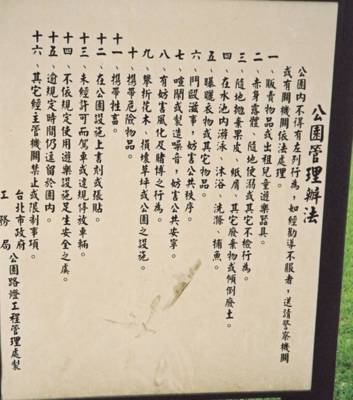
Sloppy translation:
Behavior not permitted in the park (violators will turned over to the authorities)
1. Sales or rentals of childrens' toys.
2. Nudity, urination, or other improper behavior.
3. Littering or dumping.
4. Swimming, bathing, washing, or fishing in the ponds.
5. Sunning clothing or other articles.
6. Fighting or otherwise harming public order.
7. Arguing, making loud noises, or disturbing the peace.
8. Behavior harming public decency such as gambling.
9. Picking flowers, harming the grasses or other park facilities.
10. Bringing in dangerous objects.
11. Bringing in animals.
12. Writing or posting bills on park facilities.
13. Bringing in vehicles without permission or parking in violation of regulations.
14. Using the facilities against the regulations in an unsafe manner.
15. Remaining in the park after closing.
16. Other behaviors as stipulated by the management.

George Leslie Mackay came to Tamsui as a member of the Canadian Presbyterian Mission from Oxford County, Ontario, setting up a medical clinic, a school, and a church. Pictured: the original building in which he had his church and school, bearing over its portal the name of Oxford College (see inset).


I didn't manage to take any good pictures of the Little Egret 小白鷺 (Egretta garzetta) in the preserve; this picture is from here.


Friday, June 18
Teens Who Beheaded Chickens Convicted of Animal Cruelty
Seven teenagers who beheaded two chickens because they were curious whether the birds would run around with their heads cut off will soon learn a lot more about the birds.Gee, somebody round up all the chicken butchers in Asia! Anyway, I'm glad to know the results of the experiment. And I'm intruiged that chickens are such sensitive souls that they drop dead on seeing their brethren killed. Here in Kaohsiung, they don't seem to mind.
A judge ordered the five young men and two young women -- ages 17 to 19 -- to clean chicken coops and read a book about animals' feelings as part of their sentence...
The chickens "sort of ran a very short distance, and they sort of flopped over," said defense attorney Garland Moore, who attributed the teenagers' behavior to youthful curiosity...
Moore criticized the state for initially charging the teenagers with the deaths of eight chickens, not two, on the premise the other six died because of the stress of itnessing the beheadings.
Thursday, June 17
China General Threatens War if Taiwan Targets Dam By Benjamin Kang Lim:
A Chinese general denounced an idea that Taiwan's military could threaten China's Three Gorges dam and said Wednesday that any strike on the world's biggest hydropower project would lead to war.Yeah, I think the communist dictatorship will feel free to attack the freely elected Taiwan government. Anyway, what about the part that the commies will retaliate by targeting US dams?
In its annual report to the U.S. Congress on China's military power, the Pentagon said proponents of strikes against China "apparently hope" that merely establishing places like the Three Gorges dam as targets would deter Chinese military coercion.
China will "be seriously on guard against threats from 'Taiwan independence terrorists,"' People's Liberation Army (PLA) Lieutenant General Liu Yuan said in a commentary in the official China Youth Daily, warning against such a move.
"(It) will not be able to stop war...it will have the exact opposite of the desired effect," Liu said.
"It will provoke retaliation that will 'blot out the sky and cover up the earth'," he said, quoting a Chinese idiom...
"Since Taipei cannot match Beijing's ability to field offensive systems, proponents of strikes against the mainland apparently hope that merely presenting credible threats to China's urban population or high-value targets, such as the Three Gorges Dam, will deter Chinese military coercion," it said.
Wednesday, June 16
Missing mural ignites Mexico's imagination By Hugh Dellios. Diego Rivera's "Nightmare of War, Dream of Peace", which portrayed Mao Tse-tung and Josef Stalin "as peace-loving figures confronting a war-mongering Uncle Sam" has long been missing. The dolt of a museum director says, "The theme of the mural, which is peace, would never be seen as an embarrassment". Yeah, and Mao and Stalin are both great guys, right?
China spooked by Hong Kong's films By Stefan Hammond:

Gweilo Diaries links to this screed from the Commies smearing Anson Chan, including this tidbit:
Despite decades of economic and social reform, the mainland maintains a cinematic nix-list: nudity, homosexuality, extramarital affairs and supernatural themes all remain verboten.I didn't really believe this. Pu Songling's 蒲松齡 Strange Stories from a Chinese Studio 聊斋志异 is considered a major work of literature, but according to Chinese reports, the Chinese authorities (the "Cinema Administrative Bureau" 电影局) have nixed a recent effort to film one of the stories from it: "The Painted Skin" 画皮 (pdf available in Giles' English translation here with Pu's commentary omitted), even though it looked to be a major production, starring Zhang Ziyi 章子怡.
Why is Beijing so concerned about ghosts and goblins? Politically, secret societies based on arcane beliefs have posed threats to China's power structure for centuries. Socially, the shift toward a modern culture has motivated Beijing to create a list of 'approved' religions and conveniently prohibit all else.

Gweilo Diaries links to this screed from the Commies smearing Anson Chan, including this tidbit:
The deeds of this so-called "Hong Kong conscience", who disregards facts and violates conscience, are like the classic story of Hua Pi in "Strange Tales from a Lonely Studio" - full of evil tricks.
Some old news from June 04: Yu Sen-lun wrote, The government bails out local film industry in Taiwan:
Meanwhile, Jonathan Ansfield reports Art films repackaged as porn to sell in China:
Premier Yu Shyi-kun announced last week the government will provide NT$100 million per film, as a part of a package of policy reform measures to stimulate the ailing film industry.It's a waste of money.
Meanwhile, Jonathan Ansfield reports Art films repackaged as porn to sell in China:
In "Maiden Work", amateur actors play young bohemian types in post-Mao Beijing. The film self-consciously probes the trials of a lesbian couple and a painter of nudes but, most revealingly, the film makers behind the scenes.处女作 sounds sexier in Chinese, where maiden = virgin
Repackaged, renamed and edited to accentuate the same-sex liaison, the DVD's lurid veneer gives little hint of the raw experiment inside. "Minors under the age of 18 barred from viewing," the cover stresses.
A synopsis on the cover suggests a non-existent love triangle. The movie also has a new title, roughly translating into "Women of desire, body to body".
Tuesday, June 15
Alex Tabarrok links to Robert E. Lucas Jr.'s The Industrial Revolution and quotes this final paragraph:
Of the tendencies that are harmful to sound economics, the most seductive, and in my opinion the most poisonous, is to focus on questions of distribution. In this very minute, a child is being born to an American family and another child, equally valued by God, is being born to a family in India. The resources of all kinds that will be at the disposal of this new American will be on the order of 15 times the resources available to his Indian brother. This seems to us a terrible wrong, justifying direct corrective action, and perhaps some actions of this kind can and should be taken. But of the vast increase in the well-being of hundreds of millions of people that has occurred in the 200-year course of the industrial revolution to date, virtually none of it can be attributed to the direct redistribution of resources from rich to poor. The potential for improving the lives of poor people by finding different ways of distributing current production is nothing compared to the apparently limitless potential of increasing production.
A Glass Bubble That's Bringing Beijing to a Boil
The building's French architect, Paul Andreu, has come under investigation in France and intense scrutiny in China after a terminal he designed at Charles de Gaulle International Airport in Paris partly collapsed in May, killing four people, two of them Chinese.Yes, it's a huge waste, and yes, I'm sure Chinese architects are up to the job, but I cringe at the garishly painted & bracketed pseudo-Manchu stuff that many Chinese seem to find authentically Chinese. I'm not particularly fond of the blue-green-gold-red stuff, even if it is authentic.
His troubles were taken as a green light for China's state-controlled news media and a few leading architects to raise questions about the approval process, the safety standards and the aesthetic sensitivity of Mr. Andreu's Beijing project, which is regarded as a favorite of China's semiretired senior leader, Jiang Zemin.
Beijing's cultural community is also complaining that less than 18 months before the titanium-and-glass complex is scheduled to open, there is no opening act lined up. In fact, no public or private group has agreed to operate the theater at all.
...as billions of dollars of public money are spent on skyscrapers, stadiums and transportation facilities designed by the world's leading architects, local designers are complaining that many of the projects are overpriced and out of touch with Chinese history.
JOHN TIERNEY writes, A Nation Divided? Who Says?:
Meanwhile, in Stuck in Purple America, Ilya Shapiro writes,
...[D]o Americans really despise the beliefs of half of their fellow citizens?...
To some scholars, the answer is no. They say that our basic differences have actually been shrinking over the past two decades, and that the polarized nation is largely a myth created by people inside the Beltway talking to each another or, more precisely, shouting at each other.
These academics say it's not the voters but the political elite of both parties who have become more narrow-minded and polarized. As Norma Desmond might put it: We're still big. It's the parties that got smaller...
Most voters are still centrists willing to consider a candidate from either party, but they rarely get the chance: It's become difficult for a centrist to be nominated for president or to Congress or the state legislature, said Morris P. Fiorina, a political scientist at Stanford and senior fellow at the Hoover Institution...
The [forthcoming book, Culture War? The Myth of a Polarized America] presents evidence that voters in red and blue America are not far apart. Majorities in both places support stricter gun control as well as the death penalty; they strongly oppose giving blacks preference in hiring while also wanting the government to guarantee that blacks are treated fairly by employers. They're against outlawing abortion completely or allowing it under any circumstances, and their opinions on abortion have been fairly stable for three decades...
Further evidence of a truce comes from Paul DiMaggio, a sociologist at Princeton, and colleagues who have...found that gaps among groups have been constant or shrinking for the past three decades.
"The two big surprises in our research," Professor DiMaggio said, "were the increasing agreement between churchgoing evangelicals and mainline Protestants, even on abortion, and the lack of increasing polarization between African-Americans and whites. Evangelicals have become less doctrinaire and more liberal on issues like gender roles. African-Americans are showing more diversity in straying from the liberal line on issues like government programs that assist minorities."..
Why, if the public is tolerant, would the political elites be so angry? One reason given by Professor Fiorina is the decline of party bosses, who promoted centrist candidates because their patronage systems depended on winning elections, and the corresponding rise of special-interest groups, who are more concerned with candidates' ideology.
Losing an election doesn't put pro-life or gun-control advocates out of work - in fact, it can help raise money for the cause. Nor does it hurt broadcast ratings or book sales for polarizing media figures like Sean Hannity and Al Franken, who need battles to keep their audiences entertained.
Another reason is gerrymandering, which has created so many safe seats that the only threat to incumbents comes from within the party, forcing them to appeal to the partisan voters who dominate primaries...
...when it comes to Bush...Professor Fiorina insists the voters are merely responding to a president who is more partisan than virtually all of his modern predecessors.
Meanwhile, in Stuck in Purple America, Ilya Shapiro writes,
Purple America is not so much a place as an idea, or more precisely a confluence of values from Red America with tastes from Blue America. It believes in personal responsibility, discipline, civil society, spontaneous order, ordered liberty, and that the best thing government can do is not get in the way. Yet it craves independent films, fine cigars, Belgian ales, and South American fútbol -- along with a good baseball game (preferably without the designated hitter).I actually don't agree with many of the specifics, but still, I guess I'm purple.
Saturday, June 12
India gains on China among multinationals. The article points out how in India Whirlpool manufactures for the local market, while in China it manufactures for export. So naturally it prefers India. Meanwhile, No-frills cars gain fans in China:
Chinese-owned carmakers such as Geely and Chery Automobile are grabbing sales from overseas rivals by undercutting their prices and, Honda Motor and Toyota Motor allege, stealing their designs and technology. The government said last week in an auto-industry policy statement that it wanted local carmakers to become globally known brands.
Models from Geely, China's biggest privately owned domestic automaker, and the state-owned Chery are making it harder for General Motors and other international automakers - which use more imported parts than their local rivals - to sell cars in a country where annual urban incomes average $1,000.
Protests now flourish in China
On the 15th anniversary of China's suppression of student protesters in Tiananmen Square on June 4, 1989, few in the West seem aware that Beijing is again confronting a growing volume of popular protest. Even more surprising, reports of this widespread protest are being confirmed by China's own police forces, which used to routinely deny permission for most protest demonstrations.of 1989.
Recent official police statistics are striking. The number of demonstrations increased from 8,700 to 32,000 from 1993 to 1999 - an increase of 268 percent. The number probably swelled past 40,000 in 2000. In no year during this period did protests increase by less than 9 percent, and in the financial crisis years of 1997 and 1998 they spiked by 25 and 67 percent, respectively.
Though we lack nationwide data for the years since 2000, Chinese government reports indicate that the number of public protests has probably risen each of the last three years. Sichuan, China's largest province, apparently saw an increase in protests of almost 20 percent last year, to nearly 1,500.
No region has experienced more demonstrations than the aging northeastern rustbelt, known to the West as Manchuria, where market reforms have badly hurt workers and pensioners from inefficient state enterprises. Police in Liaoning Province on the border with North Korea claimed a stunning 9,559 incidents involving more than 863,000 people between January 2000 and September 2002 - an average of almost 10 incidents involving 90 people each day for nearly three years.
Yet, save for occasional high-profile outbursts such as the worker protests in the northeast in the summer of 2002 or pro-democracy protests in Hong Kong, we hear little about unrest. Undoubtedly, a key reason is that today's protesters lack the telegenic grip of those brave young hunger strikers
Yeah, well, good luck with that.
For China's stability, a greater concern than these raw numbers is the changing style of protest. Police concede that demonstrators are gradually outgrowing the deliberately small-scale, self-contained tactics they adopted in the 1990s to avoid repression. Protests are expanding in average size, becoming more organized and confrontational, and increasingly link demonstrators from several workplaces or neighborhoods. Clever tacticians, protesters now routinely place retirees, women and children in the front ranks to shame factory managers and paralyze police.
Marriage in China:
As much as weddings in China have changed, so too has marriage itself. Gay union may still be out, but looser attitudes towards sex, marriage and divorce have led to a more colourful national love life. As late as 1989, six out of seven newly married couples would not have had sex before the paperwork was complete. Now, as many as 70% of young adults in urban areas have indulged. These numbers, according to Li Yinhe, of the Chinese Academy of Social Sciences, reveal the arrival of a sexual revolution that was long overdue. Ms Li also reckons that the rise in the divorce rate--from 3% in the 1970s to 14% today--is a healthy development, indicating that unhappy couples are no longer discouraged from divorcing in the interest of "stability".
World cup is not about football but is from Madeline Drexler's review of The Empire of Tea: The Remarkable History of the Plant That Took Over the World by Alan Macfarlane and Iris Macfarlane and Tea: Addiction, Exploitation, and Empire by Roy Moxham. She writes,
Tea is the most commonly consumed beverage on earth, after water -- and that's just a minor entry in its lengthy and truly mind-boggling resumé. Long before it started slumming in dunkable filter-paper bags, the "fragrant leaf" had inspired Ming Dynasty porcelain; cut death rates from waterborne infections; braced British colonial expansion; ignited the Opium War; necessitated the wondrous designs of 19th-century clipper ships; and energized the Industrial Revolution. More recently, of course, tea has earned renown as a rich source of health-bestowing antioxidants.So it must be true. Except Chinese started to make porcelain for tea in the Song dynasty. So are they saying that Ming-style porcelain was made for tea?
I emailed this criticism of Michael Moore by Andrew Anthony to my father, who responded,
The article about Michael Moore was pretty bad. The columnist was most supercilious and snide.Funny, I've always found Moore's the one that's supercilious and snide (which I take to mean slyly disparaging rather than dishonest, but that would fit, too; or did he mean unworthy of esteem?).
Thursday, June 3
According to DONALD G. McNEIL Jr.'s citation of Dr. Ronald C. Kessler in the New York Times' Large Study on Mental Illness Finds Global Prevalence:"In China, for instance, no word distinguishes depression from sadness". Someone's got it wrong. In both China and Taiwan, the word for depression is youyuzheng 忧郁症 (憂鬱症; don't you love those 繁體字?). In fact, unlike its English equivalent, the final "zheng" indicates that this is a disease; one could argue that in English, to the layperson "depression" is not so obviously a disease.
Otherwise, the study--based on face-to-face interviews--shows the prevalence of mental illness in urban China as being exceedingly low; around 1%; in the US it's 7.7%, far more than other developed countries. So either Americans are crazy, or we're more willing to admit it, or one could say, blame it for our problems.
Of course the WHO doesn't include Taiwan. Maybe they're all nuts here.

Otherwise, the study--based on face-to-face interviews--shows the prevalence of mental illness in urban China as being exceedingly low; around 1%; in the US it's 7.7%, far more than other developed countries. So either Americans are crazy, or we're more willing to admit it, or one could say, blame it for our problems.
Of course the WHO doesn't include Taiwan. Maybe they're all nuts here.


Wednesday, June 2
In response to this talk about female bloggers at Dan Drezner, via Is blog a masculine noun?, I find a post at Karmalised about what Bill Cosby said. I've never heard of it; so all those white bloggers I read don't seem so eager to take it up as a way to whip the black man. Clarence Page's interpretation makes sense to me.
FRANK RICH writes in It Was the Porn That Made Them Do It that
Although Rich makes no reference to it, the editor has added a photo with the caption "A historical antecedent of the photos from Abu Ghraib: The 1930 lynching of Thomas Shipp and Abram Smith in Marion, Ind."
That's something taken up by Susan J. Brison in Torture, or 'Good Old American Pornography'? She writes,
Like this Nini 妮妮, who's got an adult site, and claims to be a student at Chinese Culture University 文化大學, so the authorities are concerned about the site being harmful to society's morals 妨害風化. How do they propose to shut it down?
Some of our self-appointed moral leaders want to...blame Janet Jackson for what's gone wrong in Iraq, or if not her, then Jenna Jameson...According to him, in essence, those who blame porn are trying to devolve the Bush administation of all responsibility.
If porn or MTV or Howard Stern can be said to have induced a "few bad apples" in one prison to misbehave, then everyone else in the chain of command, from the commander-in-chief down, is off the hook. If the culture war can be cross-wired with the actual war, then the buck will stop not at the Pentagon or the White House but at the Paris Hilton video, or "Mean Girls," or maybe "Queer Eye for the Straight Guy."
The hypocrisy of those pushing this line knows few bounds. They choose to ignore the reality that the most popular images of sadomasochism in American pop culture this year have been those in "The Passion of the Christ," an R-rated "religious" movie that many Americans took their children to see, at times with clerical blessings. Mel Gibson's relentlessly violent, distinctly American take on Jesus' martyrdom is a more exact fit for what's been acted out in Abu Ghraib than the flouncings of any cheesy porn-video dominatrix.
Although Rich makes no reference to it, the editor has added a photo with the caption "A historical antecedent of the photos from Abu Ghraib: The 1930 lynching of Thomas Shipp and Abram Smith in Marion, Ind."
That's something taken up by Susan J. Brison in Torture, or 'Good Old American Pornography'? She writes,
...the similarities between American-style torture and hard-core porn are difficult not to notice and, given our tolerant, even self-congratulatory, attitude toward pornography, why should we be so shocked when torture takes this form?(emphasis mine) So whereas for Rich blaming porn is wrong, for Brison it's absolutely right. But to blame porn she not only has to drag in lynchings of blacks, omitting to explain that the soldiers in Iraq are in a quasi-combat situation; to compare them to blacks is to paint the soldiers as racist and to forget that their victims are the enemy. If we go along with her and say, yes, the soldiers are racist, and yes, the victims of their torture are all innocent, then we get to say that there is no such thing as an enemy in Iraq. She also has to find a sexual element in lynching. It makes you wonder if there is anything that's not sexualized for her. Finally, with the internet, how does this self-appointed moral leader propose to be intolerant about "the widespread production and sale of such images"?
...we -- and the rest of the world -- are also bothered by the fact that the U.S. soldiers in the pictures (and presumably those taking the pictures) clearly got a kick out of what they were doing. In this respect, these photos resemble the postcards circulating in the United States in the early 20th century showing white people smiling and cheering at the lynchings of black men (and sometimes women) -- the photos that showed us that racial animus can amount to a kind of giddy arousal. What revolts us now is not just that black men were lynched, not just that white spectators on the scene were smiling and laughing at the murders of their fellow human beings, but that the people sending the postcards could assume (and rightly so) that their recipients would also get a charge out of the images.
But we must not confuse reality with representation. Each of the black men depicted in the postcards was actually lynched -- and none of them consented to be. In contrast, the Asian women who posed naked, bound with heavy rope, and hung from trees for a 1984 Penthouse series of photos of eroticized torture presumably consented to (and were financially compensated for) their treatment and its photographic documentation. Besides, those photos, unlike the lynching postcards, were intended to give men sexual pleasure. And we all know, post-Freud, that people's imaginations are filled with all sorts of unfathomable erotic imagery and that we should be wary of suppressing the external representation of such fascinating and perplexing interior landscapes. But the lynchings of black men in the South also had a sexual component; not only did they often involve castration, but the kind of kick some white folks got out of the lynchings (and their depictions) strikes me as not all that different from a form of sexual arousal. I'm sure some white racists' fantastical interior landscapes still include trees with such strange fruit, but that would not be taken to provide sufficient reason for the rest of us to tolerate the widespread production and sale of such images.
...a disturbing amount of hard-core porn produced in the West is based on the view that violently degrading others is arousing, and we need to begin to question the assumption that whatever some people find arousing should be tolerated by the rest of us.
Like this Nini 妮妮, who's got an adult site, and claims to be a student at Chinese Culture University 文化大學, so the authorities are concerned about the site being harmful to society's morals 妨害風化. How do they propose to shut it down?
Exposed: conman's role in prayer-power IVF 'miracle'
It was a miracle that created headlines around the world. Doctors at one of the world's top medical schools claimed to have scientifically proved the power of prayer...Yeah, well, sooner or later any crap can get published. Speaking of making things up, there's also this: Boy, 14, 'posed as spy to arrange his own murder'
One of the study's authors is a conman obsessed with the paranormal who has admitted to a multi-million-dollar scam. Daniel Wirth, now under house arrest in California awaiting sentencing, has used a series of false identities for several decades, including that of a dead child...
Many scientists are now questioning how someone with Wirth's background was able to persuade Columbia University Medical Centre to unveil his research in such a high-profile way. They also want to know why it appeared in the respected Journal of Reproductive Medicine, whose vetting procedures are usually strict. 'We are concerned this study could be totally fraudulent. It is an amazing saga,' said Dr Bruce Flamm, a clinical professor at the University of California.
A schoolboy posed as a female British secret service spy in an internet chatroom to persuade a friend to try to murder him, a court heard yesterday.Hit and Run's link omits the homosexual aspect.
The boy, John, now 15, groomed a 16-year-old boy, Mark (both pseudonyms to protect the children), with an "elaborate matrix of deceit" involving six fictional characters in the MSN chatroom and correspondence totalling 56,000 lines of text.
The fictions created by John, then 14, convinced Mark that he was murdering someone who had a terminal brain tumour. He was told that his reward would be money, a job as a British secret service agent and sex with the spy, whom he believed was a middle-aged woman.
In fact, John was determined to get himself killed, which is why he never used the abort code - 6969 - that he provided.
Manchester Crown Court heard that John, who had fallen in love with Mark, also tricked him into performing sex acts on a webcam before tricking him into stabbing him twice in an alleyway at Altrincham on 29 June last year. Though John's life was in the balance for a time, he did not die and was released from hospital after a week.
Cathy Young in Reason
White panelists talking to a mostly white audience about the need for the black community to fix its problems risk coming across as offensively patronizing. But the message of responsibility was most powerfully articulated by a black speaker, Vanderbilt University law professor Carol Swain.Ouch.
Swain identified a number of cultural factors that may hold black students back, including 'dysfunctional abusive homes,' 'lack of parental involvement in the schools,' and 'negative peer pressure about learning and about high achievement as evidence of one's 'acting white.'' Better schools may provide some solutions, Swain said, but there must also be cultural change, and 'middle-class minorities must take a leadership role in this area.' On an even more controversial note, Swain identified affirmative action as currently practiced by universities--lower admissions standards for blacks and Hispanics--as part of the problem. These policies, she said, have 'created a negative incentive structure for African-Americans who have either internalized societal messages about inferiority or have chosen an easier path of not exerting themselves too vigorously' since they don't have to meet higher standards.
Tuesday, June 1
This Anti-drip law drives me crazy.
Starting June 1, the Cabinet-level Environmental Protection Administration (EPA) will use Article 27 and Article 50 of the Waste Disposal Act (廢棄物清理法) to impose fines of between NT$1,200 and NT$6,000 on violators if their air conditioners are found to drip water, which is deemed as pollution.Meanwhile, particularly in Kaohsiung, you can't drink the water, you can hardly walk down a sidewalk or under a qilou 騎樓 (pedestrian arcade) because of the parked cars and motorcycles or other miscellaneous junk, not to mention the ones that are driving there, or the danger in crossing the street. As far as Taiwan's dangerous traffic is concerned,
Taiwan's rate of accidental deaths is far higher than other developed countries, except South Korea, according to the most recent report by the WHO in 1996.
Subscribe to:
Comments (Atom)

